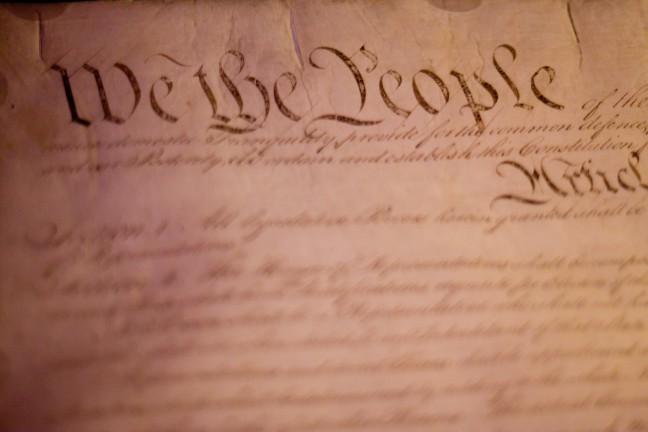Amidst national debates about the role of the first amendment in classrooms, the Tommy G. Thompson Center recently published a survey advising the University of Wisconsin to require more First Amendment teaching.
But several UW professors took a stand against the report, citing concerns with its research design.
The study, conducted by the Tommy G. Thompson Center on Public Leadership and the University of Wisconsin Survey Center, surveyed 530 UW undergraduate students regarding their “views on free speech and religious liberties.”
The surveyors sorted questions into one of five categories: hate speech, offensive or uncomfortable speech, the media, compelled speech and religious liberties. The report describes the results of the study as “troubling,” and says some students even opposed the established liberties of the First Amendment.
“Despite the fact that UW-Madison conveys its academic freedom policy through extracurricular briefings and e-newsletters, the findings of this survey show that more needs to be done,” the report states. “UW-Madison must do more to instill in its students a deeper respect for and understanding of the First Amendment, its protections and the importance of an unfettered marketplace of ideas.”
Thompson, the center’s namesake, governed Wisconsin as a registered Republican from 1987 until 2005. In the center’s pledge, they call themselves “a multi-disciplinary, non-partisan environment.”
In a recent opinion piece published by the Cap Times, UW professors Mark Copelovitch, Jon Pevehouse and Jessica Weeks challenged the conclusions of the survey and its report, stating the study did not follow rigorous research design or faithful reporting of results.
The professors noted a dissonance between data points. For example, the data said “88% of students agreed that ‘one person should not be able to prevent another person from speaking because they hold an opposing view,’” while the executive summary of the research reporting findings that “Governments should punish hate speech.”
The professors critiqued the report’s wording, saying that some survey questions read too broadly for solid interpretation.
One agree/disagree statement reads “the government should be able to punish hate speech.” UW Professor Emeritus of Journalism and Mass Communication Robert Drechsel said this question doesn’t define hate speech and isn’t nuanced enough to account for different situations or contexts.
In light of Trump’s free speech executive order, UW’s existing policy is worthy of praise
For instance, Drechsel said it’s not clear in precisely what kind of a situation might the person answer, “yes, I think the government should be able to punish hate speech,” though they might think that in the vast majority of circumstances the government shouldn’t.
Drechsel said some questions didn’t clarify whether students had trouble understanding the First Amendment versus if the students actually disagreed with aspects of the amendment.
“From a question like that, we don’t know what students actually know about the law regarding the First Amendment,” Drechsel said. “So, I don’t know if they are saying, ‘The government should do it in a different kind of world, even though I know that the First Amendment prohibits the government from doing it.”
State legislators discuss differing views of campus free speech bill
UW professor and James E. Burgess Chair in Journalism Ethics Kathleen Culver said the survey’s conclusions about students’ “substantial opposition to established free speech principles” reveal less about the students’ actual understanding of the First Amendment, and more about how students handle the tremendous responsibility of having First Amendment freedom.
Culver said there is nothing wrong with students feeling uncomfortable with hateful and discriminatory speech, and these feelings don’t necessarily mean students might try to repeal the First Amendment.
Culver said students’ uneasiness actually benefits the “marketplace of ideas” mentioned in the study, as the students expressing discomfort with hate speech are more likely to participate in that market and speak out against it. Culver said such notions reinforce the First Amendment in her view.
“What you’re seeing in those results is students really wrestling with the harm that can come from speech. That doesn’t necessarily mean they have a lack of respect for the First Amendment or that they don’t understand free expression within a democratic society,” Culver said. “It means that they’re really wrestling with the responsibilities that come along with the tremendous rights that we have, and that’s certainly what I see in my class.”
Political integrity is vital to democracy — discourse on Twitter must not be an exception
Neither Drechsel nor Culver liked the idea of changing UW instruction policy regarding the First Amendment.
Drechsel said UW needs to conduct more research about students’ knowledge of the First Amendment Law before mandating any policy changes. Culver noted the irony of requiring particular classes on free speech when the report’s concern pertains to the loss of free thought on campus.
Culver said the survey framed First Amendment complaints around the argument that college campuses are moving towards a liberal orthodoxy, and it seems paradoxical to now move towards First Amendment orthodoxy.
Culver said as important as the First Amendment is, the other amendments of the Constitution are no less important and yet the UW curriculum dramatically under-covers them.
“I think a lot of people who would use campuses as battlegrounds in the culture wars are setting up a false binary here, and in my conversations with students, they just don’t buy into it,” Culver said. “That false binary is that we could have free expression on campus, or that we could have a diverse and inclusive campus. I just don’t buy that binary, and I think a lot of students question it, and had the survey been designed a little differently, it might have teased out that very thing.”

















